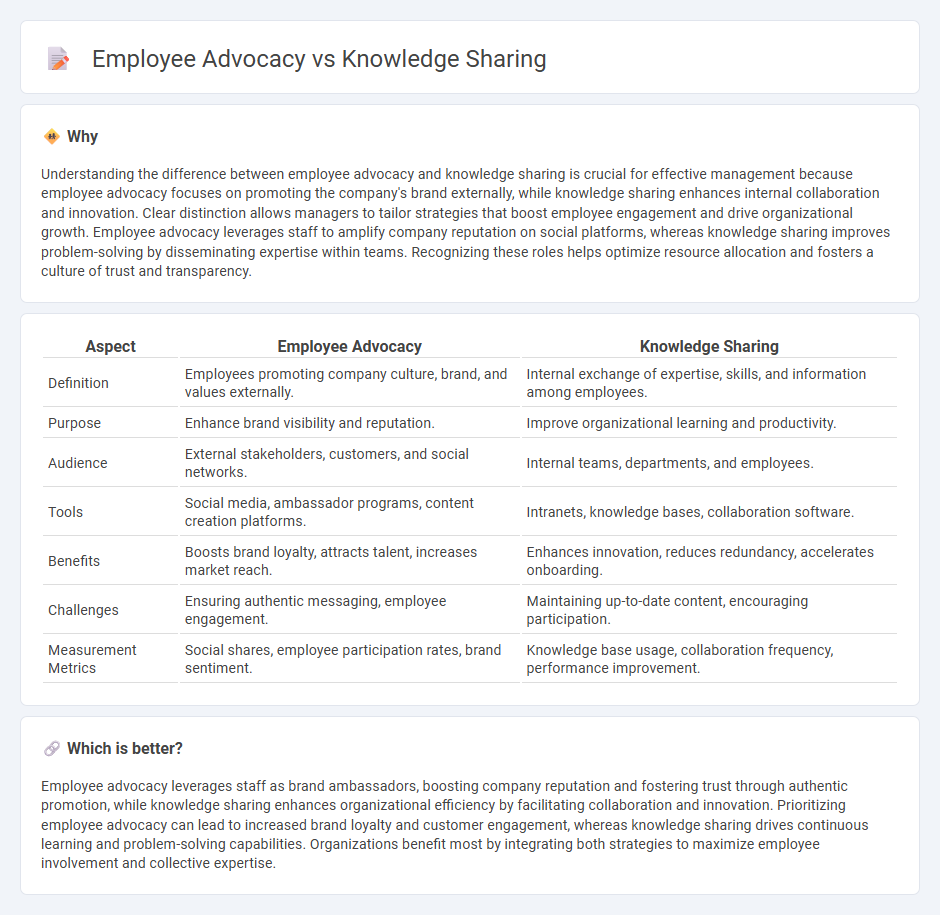
Employee advocacy empowers staff to promote their company's brand and values externally, enhancing reputation and trust through authentic voices. Knowledge sharing focuses on internal collaboration, enabling employees to exchange expertise and insights to improve overall organizational performance. Explore how combining employee advocacy with effective knowledge sharing can drive both engagement and innovation.
Why it is important
Understanding the difference between employee advocacy and knowledge sharing is crucial for effective management because employee advocacy focuses on promoting the company's brand externally, while knowledge sharing enhances internal collaboration and innovation. Clear distinction allows managers to tailor strategies that boost employee engagement and drive organizational growth. Employee advocacy leverages staff to amplify company reputation on social platforms, whereas knowledge sharing improves problem-solving by disseminating expertise within teams. Recognizing these roles helps optimize resource allocation and fosters a culture of trust and transparency.
Comparison Table
| Aspect | Employee Advocacy | Knowledge Sharing |
|---|---|---|
| Definition | Employees promoting company culture, brand, and values externally. | Internal exchange of expertise, skills, and information among employees. |
| Purpose | Enhance brand visibility and reputation. | Improve organizational learning and productivity. |
| Audience | External stakeholders, customers, and social networks. | Internal teams, departments, and employees. |
| Tools | Social media, ambassador programs, content creation platforms. | Intranets, knowledge bases, collaboration software. |
| Benefits | Boosts brand loyalty, attracts talent, increases market reach. | Enhances innovation, reduces redundancy, accelerates onboarding. |
| Challenges | Ensuring authentic messaging, employee engagement. | Maintaining up-to-date content, encouraging participation. |
| Measurement Metrics | Social shares, employee participation rates, brand sentiment. | Knowledge base usage, collaboration frequency, performance improvement. |
Which is better?
Employee advocacy leverages staff as brand ambassadors, boosting company reputation and fostering trust through authentic promotion, while knowledge sharing enhances organizational efficiency by facilitating collaboration and innovation. Prioritizing employee advocacy can lead to increased brand loyalty and customer engagement, whereas knowledge sharing drives continuous learning and problem-solving capabilities. Organizations benefit most by integrating both strategies to maximize employee involvement and collective expertise.
Connection
Employee advocacy and knowledge sharing are interconnected through the promotion of a collaborative organizational culture that empowers employees to become brand ambassadors while disseminating valuable insights. By sharing expertise and experiences, employees enhance collective intelligence, driving innovation and improved decision-making across teams. This synergy fosters trust, engagement, and a strong alignment with corporate values, elevating both internal performance and external reputation.
Key Terms
Collaboration
Knowledge sharing enhances collaboration by facilitating the open exchange of expertise and insights across teams, leading to improved problem-solving and innovation. Employee advocacy leverages collaboration by encouraging staff to promote company values and content externally, strengthening brand reputation and trust. Explore how combining knowledge sharing and employee advocacy can maximize collaborative impact.
Organizational Culture
Knowledge sharing fosters a collaborative organizational culture by encouraging open communication and the exchange of expertise among employees, which drives innovation and continuous learning. Employee advocacy promotes a positive brand image and strengthens internal culture by empowering employees to represent the company's values externally, enhancing trust and engagement. Explore how integrating knowledge sharing and employee advocacy can transform your organizational culture and drive business success.
Brand Ambassadorship
Knowledge sharing enhances employee expertise and fosters a collaborative workplace culture, while employee advocacy actively promotes the company brand through authentic, personal endorsements. Brand ambassadorship integrates both by empowering employees to share valuable insights and represent the brand positively across networks, driving trust and engagement. Discover how aligning knowledge sharing with employee advocacy can amplify your brand ambassadorship strategy.
Source and External Links
The Power of a Knowledge Sharing Culture - This document highlights the importance of knowledge sharing in fostering innovation, productivity, and a dynamic work environment within organizations.
Knowledge Sharing - Knowledge sharing is the activity through which information, skills, or expertise are exchanged among individuals, using methods such as communities of practice and mentoring.
Knowledge Sharing is Caring - This article emphasizes the role of knowledge sharing in creating a positive work environment, promoting collaboration, and supporting organizational transparency and growth.
 dowidth.com
dowidth.com